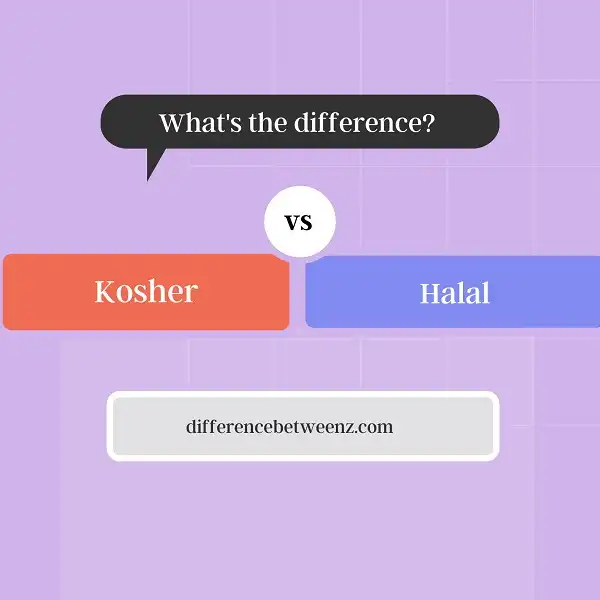The terms kosher and halal are often used interchangeably, but they actually refer to two different types of food preparation. Kosher refers to foods that have been prepared according to Jewish dietary laws, while halal refers to foods that have been prepared according to Islamic dietary laws. There are some similarities between the two systems, but there are also some key differences. In this blog post, we will take a closer look at the difference between kosher and halal food preparation.
What is Kosher?
Kosher refers to a set of dietary laws and customs that are followed by many individuals around the world. These guidelines are based on a variety of factors, including strict regulations around the types of food that are considered appropriate for consumption as well as particular practices regarding how those foods are prepared and handled. While each community may have slightly different interpretations of what it means to be kosher, there are several common themes that can be found across different groups. For instance, many kosher regulations focus on avoiding certain types of animal products, such as pork or shellfish, and adhering to the proper rules for slaughtering animals for food. Additionally, many followers of kosher guidelines will often closely monitor the way in which their food is processed in order to ensure adherence to these restrictions. Ultimately, while variations exist between different communities and traditions, the overall goal of following a kosher diet is one rooted in holiness and respect for the natural world.
What is Halal?
- Halal is a term used to describe food that is prepared in accordance with Islamic law. In order to be considered halal, a portion of food must be prepared in a certain way and must not contain any forbidden ingredients. Halal food companies must follow strict guidelines in order to be certified as halal.
- The term halal can also be used to describe other things that are permissible under Islamic law, such as business dealings and personal relationships. Halal represents anything that is good, pure, and wholesome. The opposite of halal is haram, which refers to anything that is considered to be harmful or impure.
- Muslims are required to only consume halal food and to avoid anything that is haram. This includes not only the food itself but also the utensils and equipment that it has come into contact with. Muslims are also required to say a blessing before eating in order to thank Allah for the food.
- Although the term halal is most often used in relation to food, it can technically be applied to anything that is permissible under Islamic law. By following the guidelines of Islam, Muslims can ensure that they are living in a way that is pleasing to Allah.
Difference between Kosher and Halal
There are many differences between kosher and halal, two highly-regarded dietary customs followed by members of various religious groups. Kosher generally refers to food that is prepared according to strict guidelines set out by Jewish law. These guidelines include specific ways of preparing, storing, and cooking food so that it remains in a state that is considered clean. In contrast, the term “halal” can be applied to a variety of aspects of daily life, including eating habits and social customs. One major difference between these two dietary practices is in their definitions of what can or cannot be consumed. For example, while pork products are forbidden in both kosher and halal diets, only Jews refrain from eating shellfish or other types of seafood. Similarly, while meat must be slaughtered according to certain rules for both kosher and halal diets, different practices are used for each type of food preparation. Thus, while kosher and halal dietary practices may seem similar at first glance, they emerge as distinct traditions with unique beliefs about how to honor God through our actions. This diversity makes these customs all the more exciting for anyone interested in learning about different cultures and faiths around the world.
Conclusion
Kosher and Halal are two similar, yet different, methods of food preparation. Both have religious origins and follow a specific set of guidelines that must be followed in order to call the food “Kosher” or “Halal.” However, there are some key differences between the two, which we’ve outlined for you here. If you’re looking for foods that meet the criteria for being both Kosher and Halal, look no further than our selection of products right here on our website. We carry a wide variety of items that have been certified as both Kosher and Halal, so you can rest assured knowing that your dietary needs will be met.


